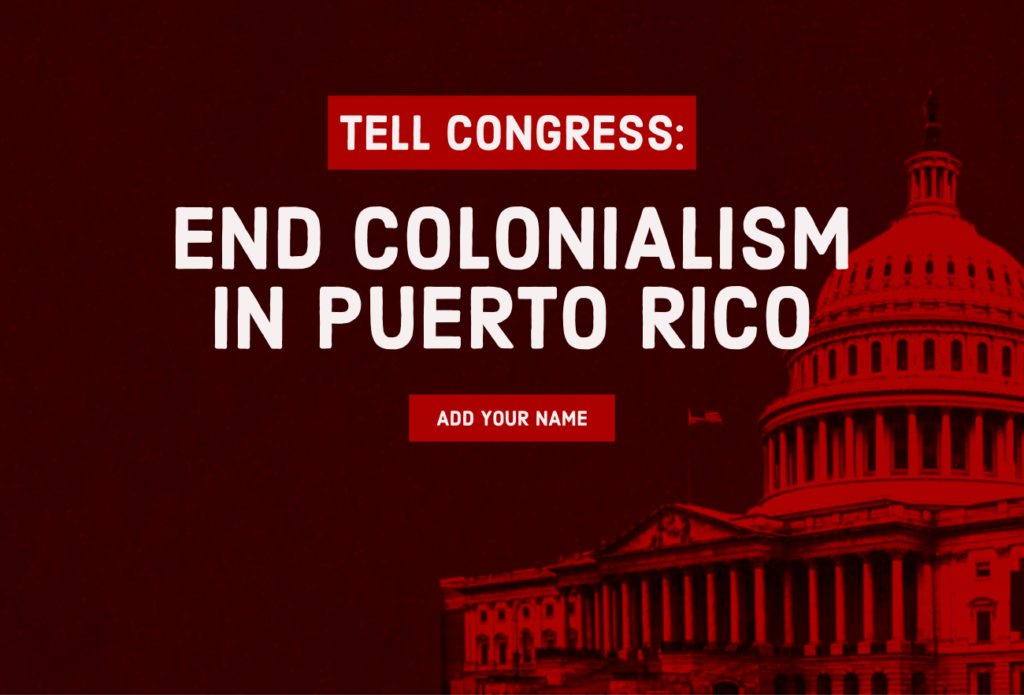The Window of Opportunity to Decolonize Puerto Rico is Quickly Closing
America was founded on the principles of equality and democracy. Yet after 124 years under the U.S. flag, Congress continues to treat Puerto Rico, home to 3.2 million U.S. citizens, as a territorial colony. This needs to end now.
Territory Status is Colonial, Undemocratic, and Unamerican
As an unincorporated territory, Puerto Rico is subject to federal laws under the control of Congress but does not participate fully in American democracy. Puerto Rico can’t vote in presidential elections, has no senators, and has only one member in the House of Representatives, who cannot vote on the House floor. So almost the totality of federal elected officials making critical decisions on matters impacting Puerto Rico’s present and future are simply not accountable to voters on the island, and are therefore acting without the consent of the governed. With the 2016 passage of the PROMESA law, Congress increased the democratic deficit even further in Puerto Rico by imposing an un-elected and un-accountable Financial Oversight & Management Board that has been making critical decisions over the judgement of all of the island’s locally elected officials.
This effectively makes Puerto Rico a colony of the U.S., which goes directly against America’s founding principles as a Nation. The lack of voting representation of the U.S. citizens of Puerto Rico in also hurts American democracy by depriving the Congress of representation that is more reflective and inclusive of the reality and diversity of the American people. Puerto Rico is more than 98% Hispanic, which will almost guarantee additional Hispanic representation in the U.S. House and Senate if Congress finally offers statehood to Puerto Rico and island voters choose that option again in a binding vote.
Territory Status Denies Equal Rights & Opportunities, Separates Families & Destroys Communities
Territory status also fails Puerto Rico and America because Congress treats island residents unequally under numerous federal laws denying them equal rights and opportunities. This form of structural inequality results in much less federal support and a much higher rate of poverty than Puerto Rico would have if it were a state. It also creates an unequal playing field which limits the island’s capacity to achieve sustainable economic development.
Given the lower quality of life, weak infrastructure and fewer employment opportunities, it’s not surprising that more and more people leave the island each year separating families and tearing communities apart. This devastating reality is evidenced by the 2020 U.S. Census which shows that Puerto Rico lost close to 12% of its population in the last decade alone, with almost all of those people relocating to the states. At this point Puerto Rico’s population has dropped from a peak of nearly 3.9 million in 2000 to 3.2 million in 2020, and the population of Puerto Ricans stateside has risen to approximately 5.8 million. This debilitating reality has been exacerbated by the devastation of the 2017 hurricanes, the 2020 earthquakes, and most recently the COVID-19 pandemic.
Piecemeal Efforts Are Not Good Enough
Unless Congress takes action quickly, Puerto Rico’s demographic, economic, and governance crisis will continue with devastating effects. While recent efforts to address debt restructuring, disparities in federal programs for Puerto Rico and disaster aid are welcome developments, they are simply not enough for the island to overcome structural inequality. Without certainty about what Puerto Rico’s ultimate political status will be both federal and local policymakers are unable to chart a course for sustainable economic growth and social progress. And every day that Congress fails to act on the fundamental issue of Puerto Rico’s political status, more people leave the island to come stateside, further weakening the territory and imperiling its present and future.
Puerto Rico’s Voters Reject the Colonial Territory Status
Puerto Rico needs a game changer, which is why voters in Puerto Rico have rejected the current territory status and chosen statehood three times in the last 10 years. In the most recent vote, held November 2020, an absolute majority voted for immediate statehood admission in a straight “Yes or No” vote. Yet Congress has failed to take definitive action in response to the will of the majority of voters. This can’t go on!
Window of Opportunity to Decolonize Puerto Rico is Closing Fast
With both chambers of Congress and the White House under the leadership of a single political party, there is a unique window of opportunity to legislate a process that will definitively decolonize Puerto Rico. Since last year, two competing bills have been presented to address the Puerto Rico status issue (H.R. 1522 and H.R. 2070). After holding two hearings, House Committee on Natural Resources Chairman Raúl Grijalva has said that they are on the verge of taking action to address this century-old issue, but Congress has yet to take any votes on the urgent proposals. With the mid-term elections coming soon, Congress must legislate in the first few months of 2022, or risk losing the chance to solve this issue yet again. And justice delayed is justice denied.
Call to Action – Support & Pass a Compromise Bill Now!
While we fully endorse H.R. 1522, we also recognize the emerging potential for a new compromise legislation which could bridge the divide between backers of H.R. 1522 and H.R. 2070, and we support the efforts to negotiate a compromise bill led by House Democratic Majority Leader Steny Hoyer. We strongly urge all members of Congress to join Puerto Rico’s top elected leaders, the Governor and Resident Commissioner, to support and pass a compromise bill now!


